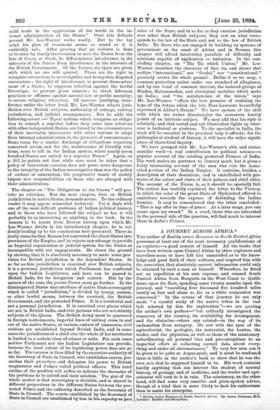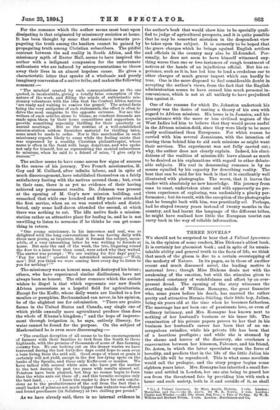A JOURNEY ACROSS AFRICA.*
THE author of Reality versus Romance in South Central Africa possesses at least one of the most necessary qualifications of an explorer,—a good conceit of himself. All the books that have been written upon Central Africa by other explorers and travellers seem to have left him unsatisfied as to the know- ledge and good faith of their authors, and inspired him with the conviction that absolutely correct information could only be obtained by such a man as himself. Wherefore, he fitted out an expedition at his own expense, and crossed South Central Africa from Benguela on the West Coast to Quilli- mane upon the East, spending some twenty months upon the journey, and "travelling four thousand five hundred miles mostly on foot and alone so far as a white companion was concerned." In the course of that journey he not only made "a careful study of the native tribes in the vast belt selected by him for exploration "—we are quoting the author's own preface—" but critically investigated the resources of the country, its availability for development, and the obstacles—where any existed—in the way of its reclamation from savagery. He saw with the eyes of the agriculturist, the geologist, the naturalist, the hunter, the trader, and the physician, as well as those of the missionary subordinating all personal bias and preconceptions to an impartial effort at collecting correct data about every- thing and under all circumstances." To very few men can it be given to be quite so Argus-eyed; and it must be confessed there is little in the author's book to show that he was the rara avis that he supposed himself to be. His work contains hardly anything that can interest the student of natural history, of geology, and of medicine, and the trader and agri- culturist will turn to it in vain. The missionary, on the other hand, will find some very sensible and plain-spoken advice, though of a kind that is more likely to dash his enthusiasm than to assist his enterprise.
* Itealitu versus Romance in South Central Africa. By James Johnson, M.D. London : Hodder and Stoughton. For the romance which the author seems most bent upon dissipating is that originated by missionary societies at home. It has been thought by some that assistance towards pro- pagating the truth among the heathen cannot be gained by propagating truth among Christian subscribers. The pitiful contrast between the sad reality in South Africa, and the missionary myth of Exeter Hall, seems to have inspired the author with a indignant compassion for the unfortunate -enthusiasts who are induced by misrepresentations to throw away their lives in an almost hopeless cause. He gives a characteristic letter that speaks of a wholesale and purely imaginary conversion of a native tribe, and makes the following comment The mischief created by such communications as the one quoted, is incalculable, giving a totally false conception of the nature of the work, and fillieg the minds of enthusiastic mis- sionary volunteers with the idea that the Central Africa natives 'are ready and waiting to reeeive the gospel.' The actual facts being the very antipodes of such statements, the effect is often to drive the most sanguine to the opposite extreme. Nor are the writers of such articles alone to blame, as constant demands are made upon them by their home committees and supporters to provide something especially thrilling for their quarterly or annual meetings. But as the routine of a well-established mission-station seldom furnishes material for thrilling tales, some must be made to order. Nor is this merchandise in such missionary reports likely to cease while the feeling exists that was expressed by a wealthy Christian philanthropist, whose name is often in the front with large donations, and who spoke not only for himself, but as representing the monied subscribers
to missions, when he said to a friend of mine, give only to success.'" The author seems to have come across few signs of success in the course of his journey. Two French missionaries, M. Goy and M. Coillard, after infinite labour, and in spite of much discouragement, have established themselves on a fairly satisfactory footing with the natives around them ; but, even in their case, there is as yet no evidence of their having achieved any permanent results. Dr. Johnson was present at the opening of M. Goy's new mission building, and remarked that while one hundred and fifty natives attended the first service, when an ox was roasted whole and distri- buted, only some half-dozen attended the second, at which there was nothing to eat. The idle native finds a mission- station rather an attractive place for loafing in, and he is not unwilling to listen to sermons if he thinks he can get some- thing in return.
" One young missionary, in his innocence and zeal, was so delighted with the long conversations he was having daily with three men posing as inquirers, that it formed the subject, mean- while, of a very interesting letter he was writing to friends at home. But near the end of the week, the trio, lingering round the door to a later hour than usual, were asked why they waited. The answer was prompt : We are waiting for five days' pay:— 4 Pay for what ? ' queried the astonished missionary.—" Well, now ! Did you think we were coming here every day to listen to you for nothing ? "
The missionary was an honest man, and destroyed his letter; others, who have experienced similar disillusions, have not always been so honest. The other romance which the author wishes to dispel is that which represents our new South African possessions as a hopeful field for agriculturists. Except for the Kaffir, whose daily wants are limited to a few mealies or pumpkins, Bechuanaland can never, in his opinion, be of the slightest use for colonisation. "There are prairie farms in the United States and Canada, any single one of which yields annually more agricultural produce than does the whole of Kbama's kingdom ; " and the hope of improve- ment through irrigation is, he says, entirely illusory, for water cannot be found for the purpose. On the subject of Ifashonaland he is even more discouraging :—
"The cruellest deception of all seems to be the encouragement of farmers with their families to trek from the South to these highlands, with the promise of thousands of acres of fine farming country free. No one looking out on the dreary wastes we have traversed during the last forty-five days could hope to earn even a bare living from the arid soil. Good crops of wheat or grain it certainly will not yield, except in the few low-lying spots on the banks of the Sprnits, and these only Kaffir-corn or me,alies. We have talked with several white men who have put the matter to the test during the past two years with results almost nil. Potatoes have been planted, but they no sooner begin to form than the white ants eat them off ; and this termite occupies only the bast land I leave the reader to draw his own conclu- sions as to the productiveness of the soil from the fact that a small basket of potatoes not much bigger than walnuts was offered and found purchasers (in Salisbury) at two shilling per pound."
As we have already said, there is no internal evidence in
the author's book that would show him to be specially quali- fied to judge of agricultural prospects, and it is quite possible that he may be somewhat mistaken in the despondent view he takes upon the subject. It is earnestly to be hoped that the grave charges which he brings against English settlers and officials in the country may also be ill-founded. Per- sonally, he does not seem to have himself witnessed any- thing worse than one or two instances of rough treatment of natives at the hands of an injudicious official. But his ex- perience, such as it is, has led him to lend a credulous ear to other charges of much graver import which can hardly be true. One is the more disposed to feel considerable doubt in accepting the author's views, from the fad that the English administration seems to have caused him much personal in- convenience, which is not at all unlikely to have prejudiced him against it.
One of the reasons for which Dr. Johnston undertook his journey was the desire of testing a theory of his own with regard to African missions. His home is in Jamaica, and his acquaintance with the more or less civilised negroes of the West Indies led him to believe that they would prove useful in the African mission-field, since they were likely to be more easily acclimatised than Europeans. For which reason he carried with him several Jamaicans, with the intention of leaving them behind him to aid such missions as might want their services. The experiment was not fully carried out ; why, the author does not clearly explain. Indeed, his eluci- dations of the realities of mission-life leave almost as much to be desired as his explanations with regard to other debate- able subjects. His zeal in denouncing romance is by no means equalled by his capacity for describing reality. The best that can be said for his book is that it is excellently well illustrated with photographs. The worst, that it leaves the reader with absolutely no new knowledge. His journey from coas to coast, undertaken alone and with apparently no pre- vious experience of exploring, was undeniably a plucky per- formance; but its result, with the exception of the photographs that he brought back with him, was practically nil. Perhaps, had he stayed twenty years instead of twenty months in the country, and had learnt the language of the different tribes, he might have realised how little the European tourist can carry back in the way of reliable information.



































 Previous page
Previous page